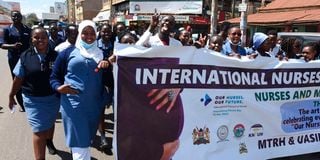Nursing jobs up for grabs in Saudi Arabia

Students from Kenya Medical Training College in Eldoret town join nurses and midwives from Moi Teaching and Referral Hospital in Eldoret town, Uasin Gishu County on May 10, 2023 during a procession in Eldoret town to celebrate International Nurses and Midwives Week.
The Kingdom of Saudia Arabia has sent out a call to Kenyan nurses and midwives who wish to work in the Middle East country to apply through an online portal, National Employment Authority (NEA).
The vacancies were announced on Tuesday by the Ministry of Labour and Social Protection, inviting qualified Kenyan nurses and midwives to work in the Kingdom of Saudi Arabia (KSA).
In a statement, State Department for Labour and Skills Development Principal Secretary Geoffrey Kaituko said this was a collaboration between the two countries which will enhance safe and productive labour migration while providing opportunities for Kenyans to work in various sectors in Saudi Arabia.
The contracts that will be issued to the nurses will be for one year but renewed annually, with a minimum salary of 4,700 SAR (Sh176, 000) per month.
“Those individuals interested must be a Kenyan citizen, registered and licensed member of the Nursing Council of Kenya, and in good standing, have a valid police clearance certificate, holding a Bachelor’s degree in Nursing Sciences or Midwifery and have a minimum of two years’ experience working in a hospital,” the PS said.
Also read: Create more jobs and we’ll return to Kenya
The nurses will be working for 48 hours a week and will get a round trip air ticket for a year and a paid up vacation for 35 days a year. Meals, housing, insurance, transportation, medical and uniform will be provided by the Ministry of Health, KSA.
“The Government of Kenya is collaborating with the Kingdom of Saudi Arabia (KSA) in enhancing safe, regular, and productive labour migration between the two countries. This initiative has facilitated employment of thousands of Kenyans in various economic sectors in the KSA which has expressed willingness to recruit additional healthcare workers from Kenya,” says the statement.
This follows a recent visit by the Labour Cabinet Secretary Florence Bore to Saudi Arabia.
In the past, Kenya has had bilateral agreements with different countries regarding health workforce collaboration, including the United Kingdom.
In 2021, retired President Uhuru Kenyatta signed a bilateral deal with the UK to employ over 20,000 nurses in a span of three years. The first batch left the country a year ago. More are yet to leave.
“I am happy that more countries are keen to employ our nurses but with Saudia Arabia, our members are not keen on going there because of how healthcare workers are being treated in that country,” said Mr Collins Ajwang, president of the National Nurses Association of Kenya.
Mr Ajwang said his organisation is not aware of what the agreement entails because they were never involved in the talks.
“We have our reservations on this. We should be involved because we have to know the terms of engagement because it involves the welfare of our members travelling for job opportunities,” he said.
However, Mr Ajwang emphasized that any engagement that will give jobs to their members is welcome provided the work conditions in those countries are made public.
“We are waiting for the government to call for a meeting and tell us what is on the table, the agreement that they have with KSA government, and what is there for our members,”Mr Ajwang said.
He said some members may want to apply because they are desperate for jobs since more than 30,000 are currently unemployed.
However, Mr Ajwang is not convinced that the Saudi Arabia deal is a good opportunity for them.
“On any bilateral decisions you are making, you need to involve us. We need to ensure that as much as they have a job, they are happy to work and attend to patients happily,” Mr Ajwang said.




